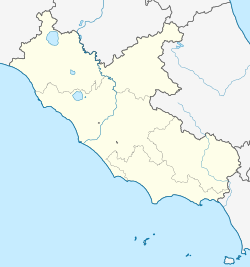Trevignano Romano
Trevignano Romano | |
|---|---|
| Comune di Trevignano Romano | |
 | |
 Coat of arms | |
show Location of Trevignano Romano | |
 Trevignano Romano Location of Trevignano Romano in Italy | |
| Coordinates: 42°09.5′N 12°14.5′E / 42.1583°N 12.2417°E | |
| Country | Italy |
| Region | Lazio |
| Metropolitan city | Rome (RM) |
| Government | |
| • Mayor | Claudia Maciucchi |
| Area | |
| • Total | 39 km2 (15 sq mi) |
| Elevation | 173 m (568 ft) |
| Population (31 December 2015)[2] | |
| • Total | 5,725 |
| • Density | 150/km2 (380/sq mi) |
| Demonym(s) | Trevignanesi |
| Time zone | UTC+1 (CET) |
| • Summer (DST) | UTC+2 (CEST) |
| Postal code | 00069 |
| Dialing code | 06 |
| Patron saint | St. Bernardino of Siena |
| Saint day | May 20 |
| Website | http://www.trevignanoromano.gov.it |

Trevignano Romano is a small town and comune in the Metropolitan City of Rome, Lazio, central Italy. With a population of about 5,000, it is located on the volcanic Lake Bracciano. It is about 47 kilometres (29 mi) away from Rome.
History[]
The presence of people in the area dates back to the Paleolithic, as shown by La Marmotta settlement in the nearby Anguillara Sabazia. Etruscans lived the city for a long while: tombs from the 8th - 6th centuries BCE have been found in the hills north of Trevignano; well-preserved artifacts from two of these tombs are on display at the local Roman Etruscan Museum. In 387 B.C. when Veio fell, the Romans conquered the whole area, where they build many villas on the lakeshore, now hidden under water. The imperial thermal spa and villa in and the Trajan Aqueduct are proofs of the roman period. During the Medieval Age, Trevignano was owned by the Prefetti di Vico and the Orsini and defended by a fortress, build on the top of the city and destroyed during the war between the Borgia and the Orsini Family. Later the city became property of some important roman families: Odescalchi , Del Grillo, Cybo Malaspina, Conti, Torlonia, Ginori Conti and Del Drago.
The castle was erected around 1200 by order of Pope Innocent III, and later reinforced by the Orsini. It once had three layers of massive walls, but the siege of Cesare Borgia in 1497 and subsequent earthquakes have reduced the structures to a state of poor-repair.
References[]
- ^ "Superficie di Comuni Province e Regioni italiane al 9 ottobre 2011". Istat. Retrieved 16 March 2019.
- ^ "Popolazione Residente al 1° Gennaio 2018". Istat. Retrieved 16 March 2019.
External links[]
- Municipalities of the Metropolitan City of Rome Capital
- Cities and towns in Lazio
- Castles in Italy
- Lazio geography stubs


